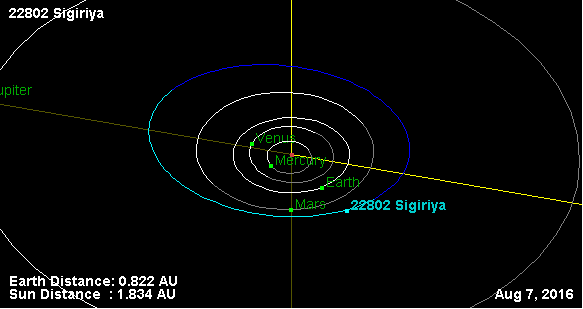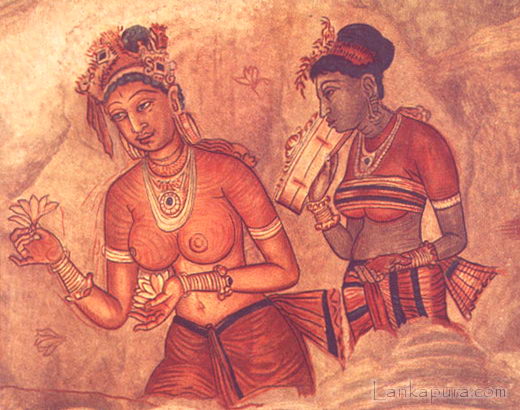
 An asteroid discovered in 1999 August 13 by the Lowell Observatory
Near-Earth Object Search at the Anderson Mesa Station and designated
1999 PK6 has recently been officially named 22802 Sigiriya, in
recognition of the fifth-century rock fortress in Sri Lanka, the
UNESCO World Heritage Site renowned for its frescoes. The name was
suggested by Dr. Nalin Samarasinha.
An asteroid discovered in 1999 August 13 by the Lowell Observatory
Near-Earth Object Search at the Anderson Mesa Station and designated
1999 PK6 has recently been officially named 22802 Sigiriya, in
recognition of the fifth-century rock fortress in Sri Lanka, the
UNESCO World Heritage Site renowned for its frescoes. The name was
suggested by Dr. Nalin Samarasinha.
Asteroid Sigiriya is a main belt asteroid between Mars and Jupiter
which takes 3.44 years to go round the Sun and has a diameter which is
probably around 4 km. It is the first location in Sri Lanka to get an
asteroid named after it. However, like most main belt asteroids, it is
too faint to be seen with even the largest telescope in Sri
Lanka. Even at it's nearest approach 122 million kms away on 2016
August 7th, with an apparent magnitude 15.8, it will be 10,000 times
fainter than the faintest naked eye star.

The first asteroid Ceres was discovered in 1801. It is the largest known with a diameter of 975 km and now been designated a dwarf Planet. It is only asteroid to get this status. Other dwarf Planets including Pluto orbit beyond Neptune. In the early days,asteroids were discovered by accident. In the first 50 years only 15 were discovered. Over the last two decades, there have been systematic surveys to discover Near Earth Objects (NEO) --- objects which come close to Earth's orbit and potentially could strike the Earth in the future. In the process, many new main belt asteroids are discovered. Over the last 60 years, the number of asteroids discovered each decade has been about 10 times more than the previous decade.
It is estimated that there are about 750,000 Asteroids larger than 1 km in diameter, 10,000 larger than 10 km, and 200 larger than 100 km and only 5 over 300 km. From over 480,000 currently known asteroids, there are now over 230,000 asteroids with reliable details on their orbits. Once the orbits are well known, they get assigned a number. Sigiriya was number 22802. The original discoverer is then allowed to propose a name and a citation. Only about 16,000 asteroids have been so far named.
Asteroid 4923 Clarke is named in honour of Sir Arthur Clarke. Arthur commented he should have got Asteroid 2001 because of his Movie "2001: A Space Odyssey". Incidentally, Asteroid 2001 is named 2001 Einstein in honour of Albert Einstein. Asteroid 9000 Hal however takes the name from the Computer Hal 9000, in the Movie "2001: A Space Odyssey".
Asteroid 6568 Serendip is named for the old Persian name for Sri Lanka, which was used in the fairy tale "The Three Princes of Serendip", whose heroes were always making pleasant discoveries of things they were not seeking.
There are few Asteroids which have been named for Lankans.
Asteroid 12871 Samarasinha for Astronomer Dr Nalin Samarasinha, in recognition of his studies on the dynamical evolution of cometary nuclei and the related dynamical processes of dust in cometary comae.
Asteroid 16107 Chanmugam for Astronomer Dr Ganesh Chanmugam (1939-1996) who was a Professor at Louisiana State University. He made broad contributions to our understanding of the magnetic and radiative properties of neutron stars and white dwarfs.
The LINEAR NEO survey by the Massachusetts Institute of Technology (MIT) which has now over 100,000 numbered asteroids. They have partnered with Society for Science & the Public to promote science education through the Ceres Connection program. http://www.ll.mit.edu/outreach/ceres.html They is name asteroids in honor of outstanding science students in fifth through twelfth grades and their teachers. They recognize first and second placed Winners at the annual Intel International Science and Engineering Fair (ISEF).
Asteroid 24517 Omattage is named for Natalie Saranga Omattage who was awarded first place in 2008 for her environmental sciences project, for which she received the Intel Foundation Young Scientist Award, while attending the School for Mathematics and Science, Columbus, Mississippi. She was born in the United States to Lankan parents.
Asteroid 25875 Wickramasekara is named for Sajith M. Wickramasekara who was awarded second place in the 2009 Intel ISEF for his medicine and health sciences team project while attending the School of Science and Mathematics, Durham, North Carolina.
In 2010 Ganindu Nanayakkara of Ananda College won first place in the Intel ISEF Grand Award for Computer Science category. His name has not yet been assigned a numbered Asteroid, but can be expected soon.
Asteroids and comets of our solar system are the only objects that can be named for an individual which is officially recognized by the International Astronomical Union (IAU). However, the IAU has strict guidelines for naming an asteroid after a person or an event. For example, one has to wait 100 years after the death of a political or military person or occurrence of a political or military event.
All other far more distant objects such as stars and galaxies, other than those which have been named many centuries ago, are assigned a name associated with their coordinate location in the Sky. The numerous websites which claim to name stars are just money making scams which just send you a nice piece of paper to frame.